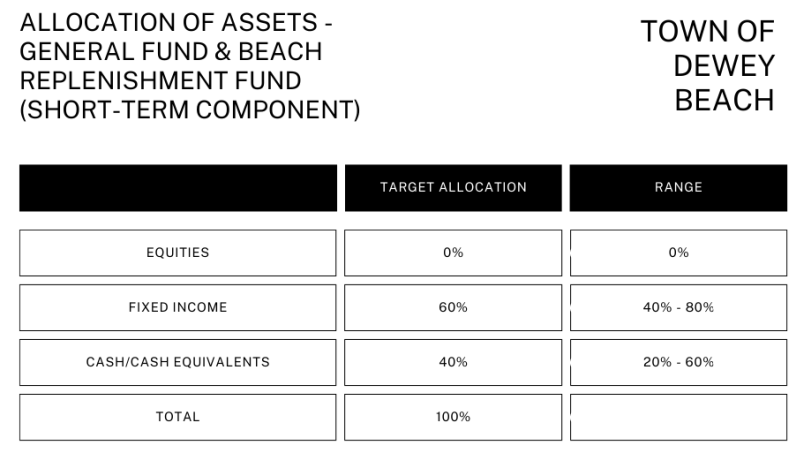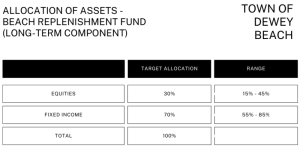The Dewey Beach Finance Committee met March 12, to review the town’s investment policy implementation plan and to discuss the transfer of its Brown Advisory operating funds.
“What I’d look at is, are we too conservative in our long-term strategy?” Commissioner Paul Bauer asked of fellow committee members. “It was fine when we had hundreds of thousands, but now we have millions, and a percent here and there makes a difference. I just want to make sure that we minimize risk but maximize yield.”
The investment policy implementation plan outlines the allocation of the town’s financial assets, including its short-term funds and long-term funds.
Currently, the town aims to allocate 60% of its short-term funds to fixed income and 40% to cash/cash equivalents.
It aims to allocate 30% of its long-term funds to equities and 70% to fixed income.
The committee voted to request an analysis from Brown of potential low-risk alternatives within the town’s investment policy that could improve the town’s returns. Members also planned to discuss with the firm whether the town’s target asset allocations are well-balanced within the given ranges, or whether they’re too conservative or aggressive.
Also discussed at the meeting was the $1.4 million in additional operating funds that the town is currently holding in a Brown Advisory account, and whether the town should keep it at Brown or transfer it into a sweep bank account. At Brown over the last year, the money has earned between 1.1% and 1.3% in interest, whereas in a sweep account, it would earn a guaranteed 4% in interest, according to Town Manager Bill Zolper and accounting and HR manager Sheena Hall.
Town officials had mixed feelings about what they should do.
It’s possible that part or all of the $1.4 million could be used to fund the new town hall and public safety building, depending on whether the town receives any additional grant money for the project. Construction of the new facility is expected to start this year, so if the $1.4 million is used to fund it, then that means the town would only have to manage the money for a short period of time.
Still, Zolper said he thinks it would be worth the hassle for them to transfer the money to a sweep account at Community Bank, one of the town-approved banks, regardless of how long it’ll be there before it’s spent.
“At least we know if it’s in that account, we’re getting 4%,” Zolper said.
Since the money is coming out of advisory accounts that are under the FDIC insured limit, transferring it poses no risk to the investment, according to Hall.
Committee member Eric Nelson said he was OK with transferring to a sweep account but said the last place he would put the money is a community bank. He also pointed out that Brown Advisory offers sweep accounts and suggested the town look into opening one there instead.
“To me, there’s no reason for moving it unless Brown’s rates are so widely out of line with what you could get at a community bank,” Nelson said.
The committee concluded that they would need more information before they could make a decision. They planned to review the town’s contract with Community Bank and look into the sweep account options at Community versus Brown.
If they decide to transfer the money to a sweep account, which is considered a cash equivalent, they may need to recommend to the commissioners a change in the town’s investment policy, particularly its allocation of assets.
The committee also discussed the annual budget development process.
“I think we need to start educating the broader public [about] the town’s financial situation,” Chair Iris Curtis said. “It’s not a bad situation, but I just get tired of seeing what’s posted online. ‘Oh, they’re wasting money on this,’ or, ‘They’re jacking up the parking, and no one’s going to come here anymore.’”
She suggested that the committee put together some snapshot reports to help people understand the reality of the town financials.
The town doesn’t have a property tax or some of the other taxes that neighboring towns have, so it must find other ways to generate revenue, such as raising the price of parking by a few dollars.
“The steady stream of income that everybody else has to live by doesn’t exist in Dewey Beach,” committee member Zeke Przygocki said. “We’ve looked through seat cushions for coins to try and get this town to have a budget every year. There are only so many coins in the seat cushions, only so many times you can go down in the couch and find a dollar bill.”
The committee threw around the idea of a possible referendum five or so years from now to increase the accommodations tax, or rental tax, which is currently at 3%. According to Zolper, all of the neighboring towns’ accommodation taxes are 6% to 8% higher than Dewey’s.
Dewey’s employees are also some of the lowest-paid around.
“Our police are still going to need raises, our lifeguards,” Bauer said. “And everybody’s a few dollars an hour higher than us. Eventually, we just have to keep pace with everybody.”
Ellen McIntyre is a reporter covering education and all things Dewey Beach. She graduated with a bachelor’s degree in journalism from Penn State - Schreyer Honors College in May 2024, then completed an internship writing for the Pittsburgh Post-Gazette. In 2023, she covered the Women’s World Cup in New Zealand as a freelancer for the Associated Press and saw her work published by outlets including The Washington Post and Fox Sports. Her variety of reporting experience covers crime and courts, investigations, politics and the arts. As a Hockessin, Delaware native, Ellen is happy to be back in her home state, though she enjoys traveling and learning about new cultures. She also loves live music, reading, hiking and spending time in nature.




















































